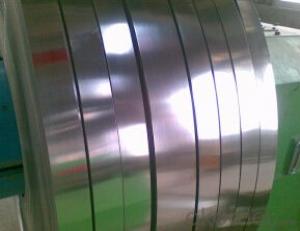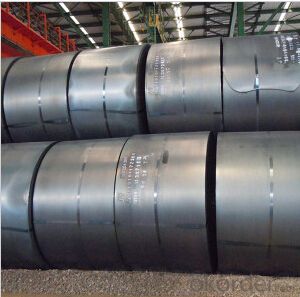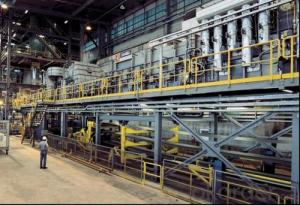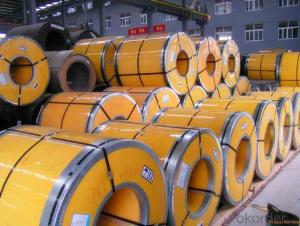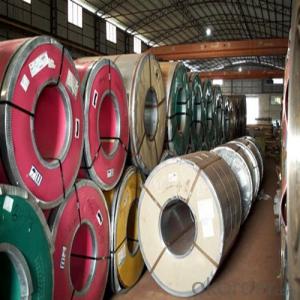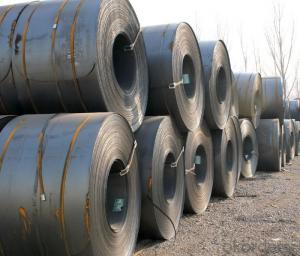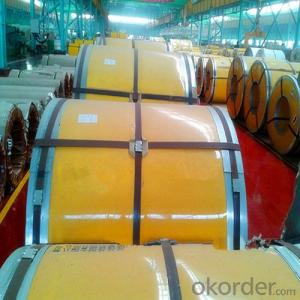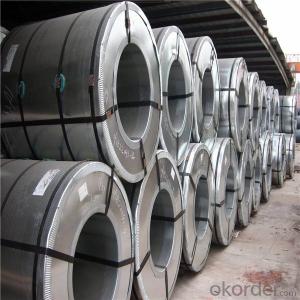Hot Rolled /Coldrolled Stainless Steel Coil with 2b/Ba Surface
- Loading Port:
- Tianjin
- Payment Terms:
- TT OR LC
- Min Order Qty:
- 25 m.t.
- Supply Capability:
- 10000 m.t./month
OKorder Service Pledge
OKorder Financial Service
You Might Also Like
Basic Info.
Model NO.:201/202/301/304
Surface Treatment:2b, Ba, Hairline, No.4, 8k, Mirror Finish etc.
Certification:ISO, SGS, BV
Technique:Cold Rolled
Standard:ASTM, JIS, GB, AISI, DIN, BS
Application:Pipe/Tube Making, Building , Kitchen Sinks/C
Edge:Mill / Slit Edge
Stock:Stock
Steel Grade:201, 202, 301, 302, 304, 304L, 316,316L
Grade:201, 202, 301, 302, 304, 304L, 316,316L
Width:20mm-1250 Mm
Thickness:0.16-3.0mm
Surface:2b, Ba, Hairline, No.4, 8k, Mirror Finish etc.
Quantity:as Request
Delivery Time:1-14 Days
Payment Term:FOB/CIF/CFR/EXW
Export Markets:Global
Product Description
it is mainly used for Pipe/tube making,building material,kitchen sinks/cutlery,baths,elevators,automotive application,industrial application,hardware-tools etc.
We are a whole industrial chain factory,main product as below :
stainless steel coil/stainless steel strip
stainless steel pipe/tube
and the Supply ability as below :
S.S HR COIL= 1000 000 TONS/ year
S.S CR COIL= 800 000 TONS/ year
s.s pipe=200 000 TONS/ year
hot rolled /coldrolled stainless steel coil with 2B/BA surface
| Material GRADE | 201, 202, 301, 304, 304L, 316, 316L |
| Standard | ASME, ASTM, EN, BS, GB, DIN, JIS, etc |
| Technique | Hot rolled / cold rolled |
| Raw material source | JHSCO or as your request |
| Width | 10mm-1250 mm |
| Thickness | 0.16mm-3.0mm |
| Quantity | as your request |
| Surface | 2B, BA, No. 4 No.1,8K, Mirror finish etc. |
| Packaging | Standard export sea-worthy packing |
| Delivery time | 1-15days |
| Supply ability | S.S HR COIL= 1000 000 TONS/ year ,S.S CR COIL= 800 000 TONS/ year,s.s pipe=200 000 TONS/ year |
| Payment terms | L/C, T/T |
| Application range | Pipe/tube making,building material,kitchen sinks/cutlery,baths,elevators,automotive application,industrial application,hardware-tools etc. |
- Q: I have a belly button piercing and the metal is stainless steel.. I was wondering does it develop rust whenever you go shower and clean it? Can I still swim in the summer with it or do I have to take it out? What happens if I swim in the pool with it?
- Theoretically stainless steel is supposed to be what it's name says it is - stainless. However there are different grades of stainless so yours might dis-colour if it's low grade. Think of all the stainless steel cutlery you use to eat with - if you keep it clean it doesn't go rusty ; it can if you don't look after it.
- Q: Hello, Do I make any damage to my stainless steel sink by cleaning it with clorox? Thank you!
- Bleach Stainless Steel Sink
- Q: Can steel coils be coated with anti-graffiti materials?
- Yes, steel coils can be coated with anti-graffiti materials.
- Q: What are the different methods of leveling steel coils?
- There are several methods used to level steel coils, including roller leveling, stretcher leveling, and tension leveling. Roller leveling involves passing the coil through a series of rollers that gradually bend and flatten the steel to remove any curvature or unevenness. Stretcher leveling uses hydraulic or mechanical forces to stretch the steel in order to eliminate any residual stress and improve flatness. Tension leveling applies tension to the steel coil while it is being passed through a series of rolls, which helps to remove any waviness or shape defects. These methods are employed depending on the specific requirements and desired flatness of the steel coils.
- Q: How are steel coils used in the manufacturing of automotive fenders?
- Steel coils are used in the manufacturing of automotive fenders by being processed and shaped into the desired fender shape. The coils are first uncoiled and then sent through a series of machines that cut and shape the steel into the specific dimensions and contours required for the fender design. These shaped steel pieces are then welded or bolted together to form the final fender structure, which is later painted and installed onto the vehicle.
- Q: Is boron steel or carbon steel a harder metal? Which one is more flexible?
- Boron is classified as a Metalloid element and is located in Groups 13, 14,15, 16 and 17 of the Periodic Table. An element classified as a Metalloid has properties of both metals and non-metals. Some are semi-conductors and can carry an electrical charge making them useful in calculators and computers.
- Q: How do steel coil manufacturers handle customer complaints?
- Steel coil manufacturers handle customer complaints by first listening to the customer's concerns and understanding the nature of the complaint. They then investigate the issue thoroughly, often by inspecting the product or reviewing production records. Once the cause of the complaint is determined, they take appropriate actions such as offering replacements, refunds, or repairs. They prioritize open communication with the customer, ensuring that their concerns are addressed promptly and professionally. Additionally, manufacturers may use customer feedback to improve their processes and prevent similar issues in the future.
- Q: How are steel coils used in the production of telecommunications equipment?
- Steel coils are commonly used in the production of telecommunications equipment as they provide structural support and durability. These coils are used to create various components of telecommunications equipment, such as cabinets, racks, and enclosures. One important application of steel coils in telecommunications equipment is the manufacturing of cabinets. These cabinets house the sensitive electronic components and wiring used in telecommunications systems. Steel coils are typically formed and shaped to create the structure of these cabinets, providing a sturdy and reliable housing for the equipment. The steel material also provides protection against external factors like impacts, dust, and moisture, ensuring the longevity and integrity of the telecommunications equipment. Steel coils are also utilized in the production of racks for telecommunications equipment. These racks are designed to hold multiple pieces of equipment, such as servers, switches, and routers, in an organized and accessible manner. The strength and rigidity of steel coils make them an ideal material for constructing these racks, ensuring that they can bear the weight of multiple devices and withstand the constant handling and movement that occurs in telecommunication environments. Furthermore, steel coils are used to manufacture enclosures for telecommunications equipment. Enclosures are protective casings that shield sensitive electronic components from external influences like electromagnetic interference and physical damage. Steel coils are often formed into specific shapes and sizes to create these enclosures, providing a robust barrier that safeguards the equipment from various external threats. In summary, steel coils play a crucial role in the production of telecommunications equipment by providing structural support, durability, and protection. They are used to create cabinets, racks, and enclosures, which ensure the proper functioning and longevity of the sensitive electronic components used in telecommunication systems.
- Q: What are the different methods of roll forming steel coils?
- There are several different methods of roll forming steel coils, including hot rolling, cold rolling, and continuous casting. Hot rolling involves heating the steel above its recrystallization temperature and then passing it through a series of rollers to shape it into the desired form. Cold rolling, on the other hand, is performed at room temperature and involves passing the steel through rollers to increase its strength and improve surface finish. Continuous casting is a method where molten steel is continuously poured into a mold and then cooled to form a solidified strip or slab. These methods offer different advantages and are used in various applications based on the desired properties of the steel product.
- Q: What are the different steel coil packaging methods?
- Some of the different steel coil packaging methods include wrapping the coil with plastic or paper, using steel strapping or banding to secure the coil, placing it in a wooden crate or box, or using steel or plastic sleeves to protect the edges of the coil.
Send your message to us
Hot Rolled /Coldrolled Stainless Steel Coil with 2b/Ba Surface
- Loading Port:
- Tianjin
- Payment Terms:
- TT OR LC
- Min Order Qty:
- 25 m.t.
- Supply Capability:
- 10000 m.t./month
OKorder Service Pledge
OKorder Financial Service
Similar products
Hot products
Hot Searches
Related keywords
